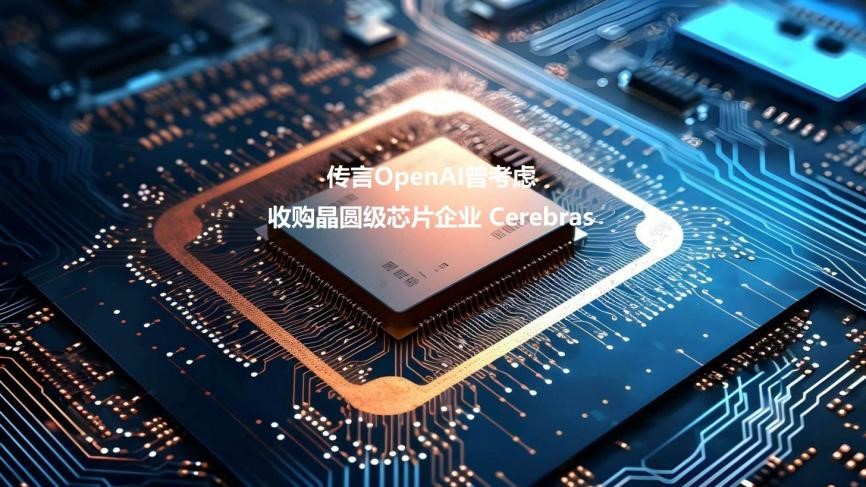Recently, a rumor that OpenAI had considered acquiring Wafer-level chip company Cerebras has attracted a lot of attention. This rumor not only reveals OpenAI's ambitions, but also reflects the fierce competition in the AI chip industry. The news comes from the new evidence documents in the legal battle between Elon Musk and OpenAI. The documents show that OpenAI began to consider entering the AI chip business around 2017. In an email to Musk and OpenAI CEO Sam Altman, OpenAI co-founder and former chief scientist Ilya Sutskever mentioned the idea of acquiring Cerebras.
1. OpenAI's "core-making dream".
Since its inception, OpenAI has been committed to promoting the development of AI technology. However, as AI models become more complex, so does the need for computing resources. According to TechCrunch, OpenAI considered entering the AI chip business back in 2017. In an email to Musk and OpenAI CEO Sam Altman, OpenAI co-founder and former chief scientist Ilya Sutskever mentioned the idea of acquiring Cerebras.
Cerebras, an innovative company focused on AI chip design, has launched wafer-level chips (WSE) with significant performance advantages. Cerebras' WSE-3 chip integrates 4 trillion transistors and 900,000 AI cores and is built using TSMC's 5nm process. In comparison, Nvidia's H100 chip contains 80 billion transistors. Cerebras' chip is 8 times better than the H100 in terms of AI training acceleration.
2. Considerations for the acquisition of Cerebras
OpenAI's motivation for considering the acquisition of Cerebras is clear. First of all, self-developed AI chips can reduce dependence on external suppliers such as NVIDIA. Nvidia currently controls about 80% of the AI chip market, and OpenAI's self-developed chip program could change that. Secondly, self-developed chips can improve OpenAI's position in the bargaining, especially when AI GPUs are in short supply, so that business promotion will not be affected.
However, the acquisition of Cerebras was not without its challenges. First of all, the R&D and production of AI chips require huge capital investment and professional technical teams. Second, OpenAI needs to consider how to integrate Cerebras' technology and team, and how to compete with competitors such as Nvidia in the market.

Pictured: OpenAI is rumored to have considered acquiring Cerebras, a wafer-level chip company
3. Abandonment of the acquisition plan
Although OpenAI considered acquiring Cerebras, it ultimately abandoned the plan. OpenAI's co-founder Ilya Sutskwi mentioned the idea of acquiring Cerebras in an email, but also expressed concern that Tesla, as a publicly traded company, is not aligned with OpenAI's mission to maximize shareholder returns, TechCrunch reported. This could mean that while the acquisition of Cerebras is beneficial to OpenAI, it may not be the best option for it.
4. The future of self-developed chips
Despite abandoning the acquisition of Cerebras, OpenAI has not given up on plans to develop its own chips. According to a report by IT House, OpenAI's chip design partner is Broadcom, and the products will be handed over to TSMC foundry. This collaboration shows that OpenAI is building a more diversified supply chain to reduce reliance on a single supplier.
Self-developed chips can not only improve OpenAI's competitiveness, but also promote the technological progress of the entire industry. However, the challenges and risks in this process cannot be ignored, and OpenAI needs to carefully plan and respond to it in terms of technology, capital, and market.
5. Industry impact
OpenAI's self-developed chip plan has a far-reaching impact on the entire AI chip industry. First of all, the addition of OpenAI may change the competitive landscape of the AI chip market. According to TechCrunch, OpenAI's self-developed chip program could pose a challenge to Nvidia's market position. Second, OpenAI's self-developed chip plan may push other companies to join the ranks of self-developed chips.
In addition, OpenAI's self-developed chip plan may also have an impact on the technological development of AI chips. According to TechCrunch, OpenAI's self-developed chip program may drive innovation in AI chip technology. For example, OpenAI may explore new chip architectures and manufacturing processes to improve the performance and energy efficiency of chips.
6. Summary
OpenAI's "core-making dream" not only reflects its pursuit of technological innovation, but also reflects its strategic layout in the AI chip industry. Through self-developed chips, OpenAI can not only improve its own competitiveness, but also promote the technological progress of the entire industry. However, the challenges and risks in this process cannot be ignored, and OpenAI needs to carefully plan and respond to it in terms of technology, capital, and market.
In short, OpenAI's self-developed chip plan may have a profound impact on the AI chip industry. The successful implementation of this plan requires not only OpenAI's technological innovation and market strategy, but also the support and cooperation of the entire industry. We look forward to OpenAI making more breakthroughs in the field of AI chips and making greater contributions to the development of the entire industry."






